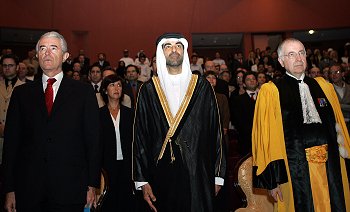Middle East

Omission of 'Persian Gulf' Name Angers Iran
 |
|
French Education Minister Gilles de Robien (left) attended a ceremony in Abu Dhabi last month to inaugurate the Persian Gulf campus of the prestigious Paris-Sorbonne University. While there, de Robien announced that a group of French experts would arrive shortly to study the possibility of opening a branch of the Louvre museum. (Photo: STR / AFP-Getty Images) |
France's celebrated art and antiquities museum, the Louvre, has deleted the word "Persian" from descriptions of the Persian Gulf in its map guides. It is an act against established United Nations guidelines, and can be viewed as a diplomatic gesture of frowning at Iran while winking at the Arab world.
Cultural discord has dominated Arab-Persian relations throughout history and one of the biggest recent debates has been over the naming of the Persian Gulf, which is essentially considered the geographical border between land of Persia (Iran) and much of the Arab world.
Although "Persian Gulf" has always been the official name for this strategic body of water, most Arab countries have hesitated to use it in recent decades and instead have invented the name "Arabian Gulf."
Now, with the rise of increasing international condemnation facing Iran due to its nuclear program, it seems that more and more Western countries have taken sides in an act which Iranian observers and journals regard as "manipulating Persian cultural and historical heritage."
In virtually every map printed before the 1960's and in most modern international treaties, documents and maps, this body of water is known by the name "Persian Gulf," a term whose historical existence can be traced back to the documents of pre-Christian Greek geographers, Strabo and Ptolemy.
By the 1960's with the rise of Arab nationalism (Pan-Arabism), some Arab countries, including the ones bordering the Persian Gulf, adopted the term "Arabian Gulf" to refer to the waterway.
Before Iran's revolution of 1979, which led to the establishment of an Islamic Republic, the name "Persian Gulf" still maintained its official credibility. However, after the political isolation of Iran in the post-revolution period and with the decreasing influence of Tehran on the political and economic priorities of the English-speaking Western World, including petroleum-related businesses, there has been an increasing acceptance of omitting "Persian" from the name on maps or even renaming it "Arabian Gulf."
The matter is widely criticized in Iran and according to the Iranian press, "hurts the hearts of tens of millions of Iranians who, aside from any political clashes and ambiguity, simply love their country."
The Louvre's decision to delete the word "Persian" comes amid intense negotiations aimed at exporting Europe's cultural crown to the heart of the Arab world.
For more than a year talks have been underway between Paris and Abu Dhabi to open a branch of the Louvre in the United Arab Emirates. Reportedly, the prestigious museum is set to receive $1 billion to put its elite cultural pieces on display at the branch.
In France, the negotiations have faced questions, such as from the French daily Libération, which queried whether the project was the "most novel and controversial deal in the history of French cultural politics." Many believe that the proposal is much more of a political step rather than a cultural fusion between the East and the West.
"My feeling is this is a project more determined by political than artistic considerations," Philippe Régnier, editor of the French Journal des Arts, told the British daily, the Guardian. "It is about France's presence in the region and its economic concerns. This isn't a project piloted by the museum or its curators, it has been taken over by the ministry of culture."
Apart from the recent negotiations, the Louvre has handsomely benefited from money donated by Arab fundraisers. The museum is expected to open an Islamic art wing in 2009 which has already received $20 million from Saudi billionaire Prince Walid bin Talal. It has also recently received a donation of around $7 million from Sabah Al Ahmad Al Sabah, the Emir of Kuwait, as reported by Agence France-Presse.
Omission of the word "Persian" in the Louvre's newly printed guide was swiftly followed by Tehran's official objection.
"We have recently become aware of this," said Iranian foreign ministry spokesman Mohammad Ali Hossieni. "Certainly, our embassy will object to this and will pursue the case."
This is not the first time Iran has vehemently protested over the naming of the waterway separating Iran and the Arabian Peninsula. In 2004, Tehran firmly objected to the move by the National Geographic when it printed the words "Arabian Gulf" as an alternative name (in smaller type and in parentheses) for the Persian Gulf in its atlas.
Apart from the official objections made by the government, Iranian people worldwide protested the act by signing numerous petitions to remove the alternative name.
To further their campaign, Iranian Web users designed and launched a "Google bomb," which appears at the top of Google's search results for the term "Arabian Gulf." The Web page reads: "The gulf you are looking for is unavailable. No body of water by that name has ever existed. The correct name is Persian Gulf, which always has been, and will always remain, Persian."
The then-Iranian foreign minister, Kamal Kharazi, described it as a "victory for every Iranian" when National Geographic officially apologized and the offending phrase was removed.
The United Nations on many occasions has requested that only "Persian Gulf" be used as the official and standard geographical designation for the body of water. The United Nations Secretariat has issued two editorial directives, in 1994 and 1999, affirming the organization's position on the matter. The use of the name "Arabian Gulf" was described to be "faulty" by the eighth United Nations Conference on the Standardization of Geographical Names, held in Berlin from Aug. 5 to Sept. 2, 2002.
The addendum to the United Nations' editorial directive further states that: "The full name 'Persian Gulf' should be used in every case instead of the shorter term 'Gulf,' including in repetitions of the term after its initial use in a text."
View the Worldpress Desk’s profile for Niusha Boghrati.



